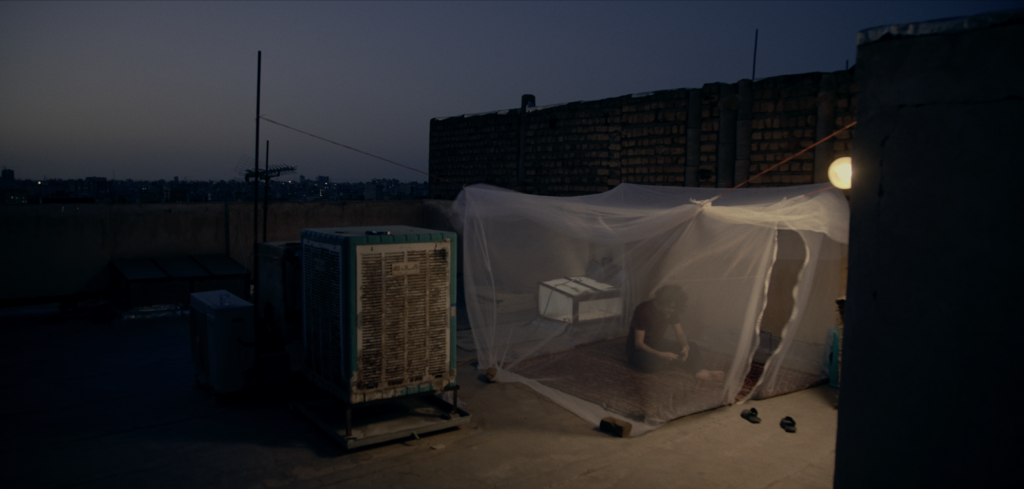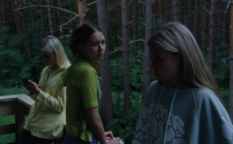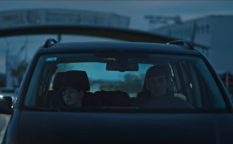Can I Hug You? (2023)

“We have the most comprehensive rules. They cover all aspects of life”, explains a teacher in an all-boys school, adding that “there are men and young boys on the street, so hijab is essential for safety.” The boys make jokes about the teacher’s words in an absolutely unquestionning manner, with one of them retorting how “it would indeeed come to the end of the world if things were any different.”
Iranian helmer Hossain Behboudi Rad and his wife and fellow filmmaker Elahe Esmaili, the writer/ director of the short drama documentary Can I Hug You were both born and raised in the city of Qom, known for breeding extremist ideologies that shaped the Iranian regime*. After many attempts to immigrate, they finally settled down in England to live a life they were longing for, far away from restrictions and as it turns out, to take a physical distance from Hossain’s trauma that his wife became aware about only after a long period of time.
In strictly patriarchal societies, only girls are being subjected to rigorous laws regarding their sexuality, and potential ‘moral downfall’ before the marriage. They are supervised from the first signs of puberty, they have to oblige, be humble and silent, learn how to do the chores and become a perfect catch for a suitor who expects to marry an ‘untouched’, succumbing wife, who will give birth to heirs and raise them to be as manly as the expectations go.
You don’t have to go as far as Iran to have a taste of it. I was born and raised in a country (former Yugoslavia, now Serbia) where fathers would (almost always jokingly) say that they have ‘two children and a daughter’. This scaringly wrong wording has fortunately disappeared in the past few decades, also (but not only) due to the laws that finally came to power and enforced a form of equality that still is far away from ideal. At the same time, there is still a stigma about boys and young men being sexualy assaulted, because not only that ‘boys don’t cry’ they are also strong enough to defend themselves from the perpetrators, hit back and say ‘no.’
As a mother of a pre-teenage boy, my biggest fear is that my son might be aggressed by someone known or unknown. Before I moved abroad, this concept was completely foreign to me as something that could never ever happen to a boy or a young lad. That was until I started speaking to other exchange students in Sweden, who would tell me the horror stories after a couple of pints, blinded by tears. My younger self was in shock. Something like that ‘didn’t happen in Serbia’. Right?
Of course it did, but no one was ever paying attention to where the sons were. The society, and consequently families, were more concerned about their sons potentially becoming soft, and god forbid – gay. While the girls were playing family, pretending to iron and make cakes, the boys would be out kicking ball or riding their bikes, dreaming to become doctors and astronauts, or some other great experts in professions promissed to them at birth. Many moons later, despite of re-written laws, the #metoo movement and lots of public debates and initiatives, many countries are light years away from securing the long-saught equality, and recognizing that the child abuse has no gender.
We have been following the protests in Iran ignited by the murder of Mahsa Amini since 22 September last year, and we are still rooting for the brave women who risk their lives by refusing to wear hijabs and comply to country’s strict rules of gender segregation. Esmaili’s film, inspired by her husband’s traumatic experiences in childhood raises other questions. Are the boys safe? Are they ever? When the focus is on one gender only, who saves the little guys? Also -how can you talk to your deeply pious family about things they don’t comprehend? How can you utter those words? At the end of the day, a ‘man must be strong’, even if he is still a boy who wants to explore the world on his bike in an allegedly ‘sheltered’ neighbourhood?
Can I Hug You is one of the most devastating documentaries in recent years, but also a big love testimony between Rad and Esmaili who both opens and closes the film with her personal take on things. She is the one helping her husband vocalising his feelings, guiding him through the challenging sutiations, and delivering the title of the movie with simple, deeply loving question “May I Hug You?”. In the end, the family also joins in an unison support of their son, devastated by something they could not see, overcoming their conservative beliefs.
Facing your family in front of the running camera is the hardest thing for anyone who suffered big injustice but who at the same time loves their parents and fears their reactions. You know where they come from, you understand how the system made them blind to your suffering, you want to comfort them you in your worse moments in life, and yet – you feel like you are stabbing them in heart.
The wonderful, and at the same time heart-tearing intervention is the animation illustrating the events leading to the multiple sexual abuse of Hossain Behboudi Rad as a child , delivering a mighty message about things we sometimes oversee, but should not in order to make the lives of our offspring better. Partriarchy takes no prisoners, it slays its children regradless of their gender.
This is the award-winning director Esmaili’s third short film, that comes two years after her critically acclaimed short documentary The Doll. One thing should be said – if you love someone, listen to what they’ve got to say because nobody else will catch you like that if you fall.
- the official statement from the press kit
















